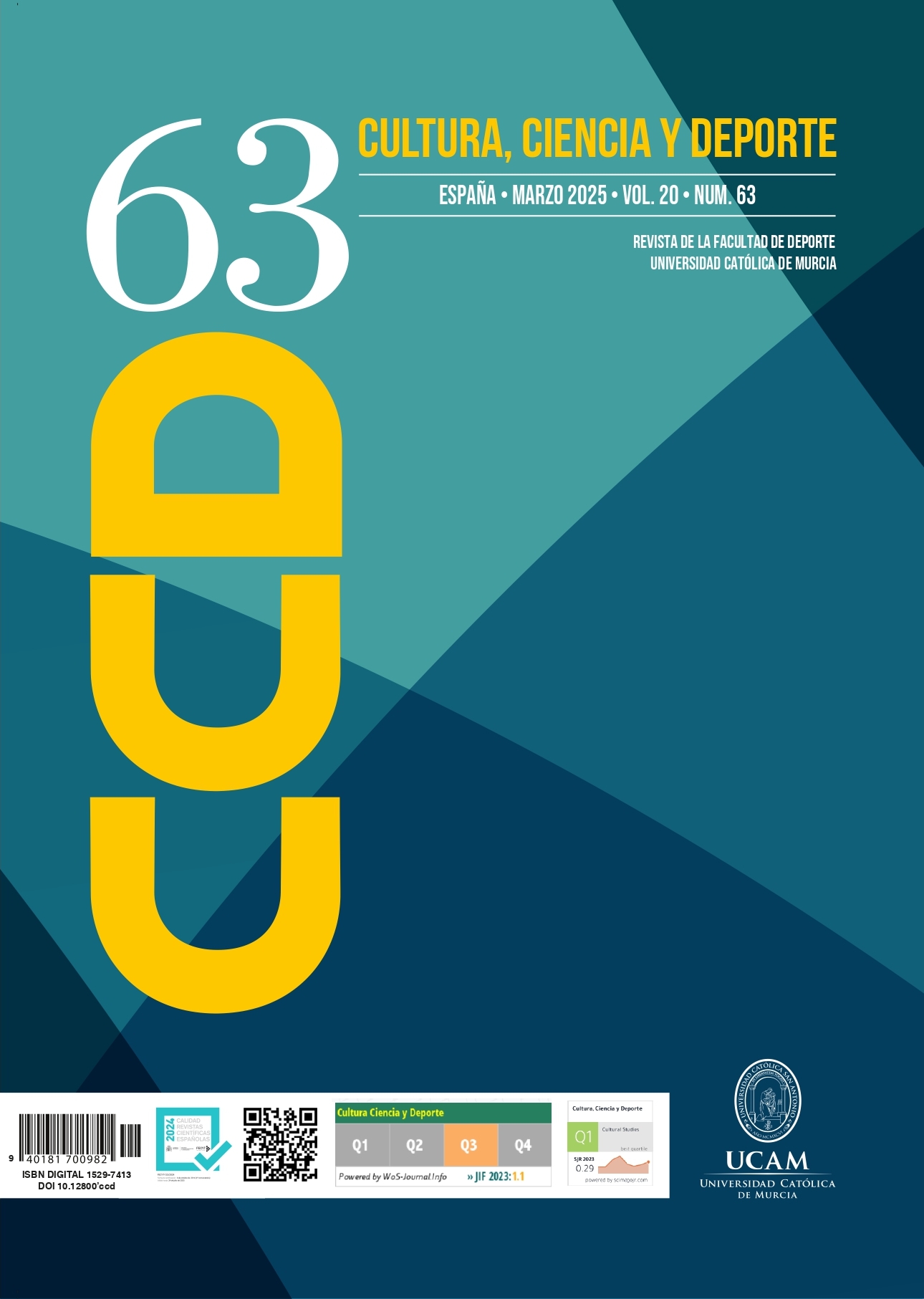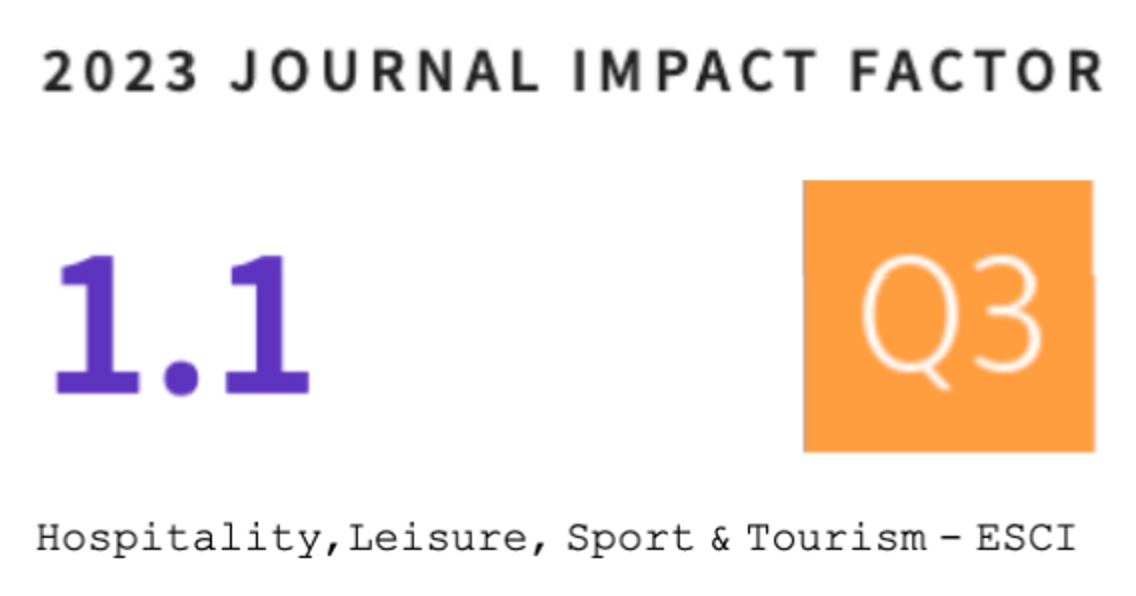Student-Athletes and Sports Stakeholders’ Perceptions on the Edmedia Educational Platform for Training and Promoting Dual Career on Social Media
DOI:
https://doi.org/10.12800/ccd.v20i63.2237Abstract
Elite athletes face challenges in developing Dual Careers, despite the potential benefits for their future employment. Successful implementation of Dual Careers requires awareness of their importance by both athletes and their environments. Thus, student-athletes with strong Social Media influence should leverage their platforms to support and highlight the significance of balancing sports and academics (Dual Career), thereby enhancing their future prospects after their sports careers. In this context, the EdMedia educational platform was developed to promote Dual Careers and institutional support policies through social media, as well as to train and connect student-athletes with media specialists, coaches, and other sports stakeholders. After the implementation of the program and the platform, a quantitative approach was used through a questionnaire with previously validated scales and high reliability indexes, measuring variables such as usability, learning effectiveness, satisfaction and perception of the contents. One hundred and forty student-athletes and 111 sports stakeholders from six European countries participated in the evaluation of the platform. The results revealed how both groups perceived different aspects of online educational platform, and identified which aspects most influenced the effectiveness of the online educational experience. These findings are valuable for improving the platform’s role in promoting Dual Careers through social media, increasing awareness of the importance and benefits of pursuing a Dual Career, and the support required from academic and sporting institutions. Finally, the study offers some practical implications for improving the design of online educational platforms, providing a model that combines information and academic and sports training, and highlights the importance of involving key stakeholders in the promotion of Dual Career through social media.
References
Abeza, G. (2023). Social media and sport studies (2014–2023): A critical review. International Journal of Sport Communication, 16(3), 251-261. https://doi.org/10.1123/ijsc.2023-0182
Abeza, G., & King-White, R. (2023). Sport and social media in business and society. Taylor & Francis. https://doi.org/10.4324/9781003358398
Abeza, G., O’Rilley, N., Sanderson, J., & Frederick, E. (2022). Social media in sport: Theory and practice. Journal of Sport Management, 36(5), 515-517.
Aquilina, D., & Henry, I. (2010). Elite athletes and university education in Europe: A review of policy and practice in higher education in the European Union Member States. International Journal of Sport Policy and Politics, 2(1), 25-47. https://doi.org/10.1080/19406941003634024
Blicker, L. (2005). Evaluating quality in the online classroom. En Encyclopedia of distance learning (pp. 882-890). IGI Global. Bonsu, A. O., &
Anim-Wright, K. (2024). Personal branding: A systematic literature review. International Journal of Marketing Studies, 16(1). https://doi.org/10.5539/ijms.v16n1p30
Byrne, M., & Flood, B. (2003). Assessing the teaching quality of accounting program: An evaluation of the Course Experience Questionnaire. Assessment & Evaluation in Higher Education, 28(2), 135-145. https://doi.org/10.1080/02602930301668
Capranica, L., Figueiredo, A., Ābeļkalns, I., Blondel, L., Foerster, J., Keldorf, O., Keskitalo, R, Kozsla, T., & Doupona, M. (2021). The contribution of the european athlete as student network (EAS) to European dual career ERASMUS+ sport collaborative partnerships: An update. Cultura, Ciencia y Deporte, 16(47), 7-17. https://doi.org/10.12800/ccd.v16i47.1693
Capranica, L., & Guidotti, F. (2016). Research for cult committee qualifications/dual careers in sports. European Parliament: Directorate-General for internal policies. Policy Department. Structural and cohesion policies: Cultural and education. http://www.europarl.europa.eu/RegData/etudes/STUD/2016/573416/IPOL_STU(2016)573416_EN.pdf
Capranica, L., Guidotti, F., Gonçalves, C., Blondel, L., Bovis, M., Costa, R., Debois, N., Figueiredo, A., MacDonncha, C., Pecnikar-Oblak, V., Patoret, J.-L., Pišl, A., Rheinisch, E., Rolo, A., Ryan, G., Templet, A., Tessitore, A., Warrington, G., & Doupona, M. (2022). Development of an online multilingual educational programme for parents of dual-career athletes: A participatory design. Frontiers in Psychology, 13, Article 855531. https://doi.org/10.3389/fpsyg.2022.855531
Cifuentes-Faura, J. (2020). Docencia online y Covid-19: La necesidad de reinventarse. Revista de Estilos de Aprendizaje, 13(Especial), 115-127. https://doi.org/10.55777/rea.v13iEspecial.2149
Coalter, F. (2015). Sport-for-change: Some thoughts from a sceptic. Social Inclusion, 3(3), 19-23. https://doi.org/10.17645/si.v3i3.222
Conde, E. (2013). La conciliación de la vida deportiva y la formación en los deportistas de alto nivel en España: Una visión cuantitativa [Tesis doctoral]. Universidad de Castilla-La Mancha. http://hdl.handle.net/10578/3609
Cronbach, L. J., & Shavelson, R. J. (2004). My current thoughts on coefficient alpha and successor procedures. Educational and Psychological Measurement, 64(3), 391-418. https://doi.org/10.1177/0013164404266386
Eom, S. B., Wen, H. J., & Ashill, N. (2006). The determinants of students’ perceived learning outcomes and satisfaction in university online education: An empirical investigation. Decision Sciences Journal of Innovative Education, 4(2), 215- 235. https://doi.org/10.1111/j.1540-4609.2006.00114.x
European Commission. (2012). EU guidelines on dual careers of athletes: Recommended policy actions in support of dual careers in high-performance sport. Sport Unit of the Directorate-General for Education and Culture of the European Commission. http://ec.europa.eu/sport/news/20130123-eu-guidelines-dualcareers_en.htm
Floyd, K. S., Harrington, S., & Santiago, J. (2009). The effect of engagement and perceived course value on deep and surface learning strategies. Informing Science, 12, 181-190. https://doi.org/10.28945/435
Frederick, E. L., Lim, C. H., Clavio, G., & Walsh, P. (2012). Why we follow: An examination of parasocial interaction and fan motivations for following athlete archetypes on Twitter. International Journal of Sport Communication, 5(4), 481-502. https://doi.org/10.1123/ijsc.5.4.481
Geurin-Eagleman, A. N., & Burch, L. M. (2016). Communicating via photographs: A gendered analysis of Olympic athletes’ visual self-presentation on Instagram. Sport Management Review, 19(2), 133-145. https://doi.org/10.1016/j.smr.2015.03.002
Guidotti, F., Conte, D., Bertocchi, L., Doupona, M., & Capranica, L. (2023). Dual career in European-funded projects: A critical analysis and review. Revista Brasileira de Ciências do Esporte, 45, Article e20230057. https://doi.org/10.1590/rbce.45.e20230057
Guidotti, F., Cortis, C., & Capranica, L. (2015). Dual career of European student-athletes: A systematic literature review. Kinesiologia Slovenica, 21(3). https://www.kinsi.si/en/archive/2015/278/dvojna-kariera-evropskih-studentov-sportnikov-%E2%80%93pregled-literature
Henriksen, K., & Stambulova, N. (2017). Creating optimal environments for talent development: A holistic ecological approach. In Routledge handbook of talent identification and development in sport (pp. 270-284). Routledge.
Highfield, T., Harrington, S., & Bruns, A. (2013). Twitter as a technology for audiencing and fandom: The #Eurovision phenomenon. Information, Communication & Society, 16(3), 315-339. https://doi.org/10.1080/1369118X.2012.756053
Hopkins, J. P., Hopkins, K., & Whelton, B. (2012). Being social: Why the NCAA has forced universities to monitor student-athletes’ social media. University of Pittsburgh Journal of Technology Law and Policy, 13(1). https://ssrn.com/abstract=2272635
Ionuţ, O., Aurelia, A. B., & Mihael, O. R. (2023). Social media and dual career promotion for sports high school students. Sport & Society/Sport si Societate, 23(1). https://sportsisocietate.ro/articol/618
Javani, V., Karimivand, H. (2022). Social media and sports stakeholders challenges and opportunities. Journal of New Studies in Sport Management, 3(3), 494-508. https://doi.org/10.22103/jnssm.2022.19154.1068
Kegelaers, J., Wylleman, P., Kenttä, G., Vitali, F., Cecić Erpič, S., Regüela, S., Teller, C., & De Brandt, K. (2024). Recommendations to promote mental health in dual career development environments: An integrated knowledge translation approach. Journal of Applied Sport Psychology, 36(6), 855-879. https://doi.org/10.1080/10413200.2024.2334283
Kember, D., & Leung, D. Y. P. (2008). Establishing the validity and reliability of course evaluation questionnaires. Assessment and Evaluation in Higher Education, 33(4), 341-353. https://doi.org/10.1080/02602930701563070
Lebel, K., & Danylchuk, K. (2012). How tweet it is: A gendered analysis of professional tennis players’ self-presentation on Twitter. International Journal of Sport Communication, 5(4), 461-480. https://doi.org/10.1123/ijsc.5.4.461
Lingam-Willgoss, C. (2021). Retirement from sport: The final transition. En Athletic development (pp. 54-69). Routledge.
López de Subijana, C., Barriopedro, M., & Conde, E. (2015). Supporting dual career in Spain: Elite athletes’ barriers to study. Psychology of Sport and Exercise, 21, 57-64. https://doi.org/10.1016/j.psychsport.2015.04.012
Meiselwitz, G., & Lu, C. (2005). Questionnaire for evaluation of usability and learning outcomes in online instruction. En Proceedings of the 4th European Conference on e-Learning (ECEL 2005). Academic Conferences Limited.
Mejías, J. T., Torregrosa, M., Casas, A. J., Borrueco, M., Bauzá, J. P., & Laloux, Y. R. (2021). Taxonomía de entornos desarrolladores de carrera dual en España. Cultura, Ciencia y Deporte, 16(47), 19-29. https://doi.org/10.12800/ccd.v16i47.1624
Miller, G. L., & Sisk, F. A. (2019). Online teaching effectiveness: Closing the gap [Sesión de conferencia]. En Marketing Management Association Annual Conference Proceedings, Santa Fe (pp. 84-85).
Morales-Salas, R. E. (2021). El video como recurso didáctico digital que fortalece el aprendizaje virtual. Edutec: Revista Electrónica de Tecnología Educativa, 77, 186-202. https://doi.org/10.21556/edutec.2021.77.1939
Moustakas, L., Kalina, L., Sánchez-Pato, A., Conde, E., & Ege, H. (2022). Entrepreneurship, education, and athletes: Entrepreneurship within European dual career programmes. En Strategic innovation: Research perspectives on entrepreneurship and resilience (pp. 77-88). Springer.
North, J., & Lavallee, D. (2004). An investigation of potential users of career transition services in the United Kingdom. Psychology of Sport and Exercise, 5(1), 77-84. https://doi.org/10.1016/s1469-0292(02)00051-1
Panigrahi, R., Srivastava, P. R., & Panigrahi, P. K. (2021). Effectiveness of e-learning: The mediating role of student engagement on perceived learning effectiveness. Information Technology & People, 34(7), 1840-1862. https://doi.org/10.1108/itp-07-2019-0380
Park, J., Williams, A., & Son, S. (2020). Social media as a personal branding tool: A qualitative study of student-athletes’ perceptions and behaviors. Journal of Athlete Development and Experience, 2(1). https://doi.org/10.25035/jade.02.01.04
Peltier, J. W., Drago, W., & Schibrowsky, J. A. (2003). Virtual communities and the assessment of online marketing education. Journal of Marketing Education, 25(3), 260-276. https://doi.org/10.1177/0273475303257762
Porto-Maciel, L. F., Gelcemar-Farias, G., Dallegrave, E. J., Flach, M. C., do Nascimento, J. V., & Folle, A. (2023). Sports and school involvement and performance: A systematic review of literature. Retos: Nuevas Tendencias en Educación Física, Deporte y Recreación, 47, 12-24. https://doi.org/10.47197/retos.v46.90498
Prasetya, M. R. A., & Chow, H. W. (2023). The influence of social media on mental health and physical of adolescent athletes: A systematic review. Indonesian Journal of Kinanthropology, 3(1), 28-34. https://doi.org/10.26740/ijok.v3n1.p28-34
Sanderson, J., Browning, B., & Schmittel, A. (2015). Education on the digital terrain: A case study exploring college athletes’ perceptions of social-media training. International Journal of Sport Communication, 8(1), 103-124. https://doi.org/10.1123/ijsc.2014-0063
Vidal-Vilaplana, A., González-Serrano, M. H., & Calabuig-Moreno, F. (2024). Exploring employable profiles of elite student athletes through fsQCA: Unleashing the power of their soft skills. Education + Training, 66(9), 1311-1327. https://doi.org/10.1108/et-04-2024-0157
Vidal-Vilaplana, A., Valantine, I., Staskeviciute-Butiene, I., González-Serrano, M. H., Capranica, L., & Calabuig, F. (2022). Combining sport and academic career: Exploring the current state of student-athletes’ dual career research field. Journal of Hospitality, Leisure, Sport & Tourism Education, 31, Article 100399. https://doi.org/10.1016/j.jhlste.2022.100399
Wang, Y., Pan, Z., & Wang, M. (2023). The moderating effect of participation in online learning activities and perceived importance of online learning on EFL teachers’ teaching ability. Heliyon, 9(3), Article e13652. https://www.cell.com/heliyon/fulltext/S2405-8440(23)01097-6
Published
How to Cite
Issue
Section
License
Copyright (c) 2025 Creative Commons Attribution License

This work is licensed under a Creative Commons Attribution-NonCommercial-ShareAlike 4.0 International License.
The authors who publish in this journal agree with the following terms:
- The authors retain the copyright and guarantee the journal the right to be the first publication of the work as well as licensed under a Creative Commons Attribution License that allows others to share the work with recognition of the authorship of the work and the initial publication in this journal.














